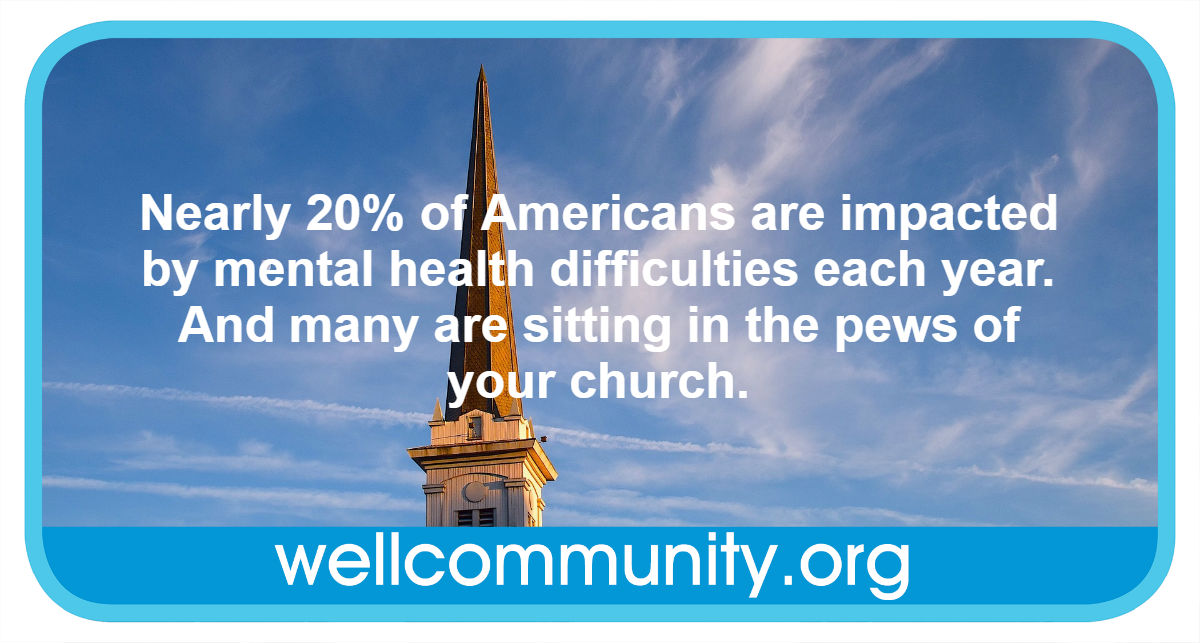 By Carol Dowsett
By Carol Dowsett
Nearly 20% of Americans are impacted by mental health difficulties each year. And many are sitting in the pews of your church. Did you know that?
While churches typically stand at “high alert” to be attentive to members facing urgent medical crises such as heart attacks, surgeries, cancer and major injuries, few are mindful of or equipped to support those managing a mental illness.
How can your church become aware of ways it can be a place free of stigma, a place full of compassion, acceptance and support for individuals and family living through the challenges of mental illness?
Kay Warren, co-founder of Saddleback Church and mother of a son who lost his life to suicide, gives six very practical ideas,* which together spell “CHURCH,” for churches seeking to become the kinds of places where Jesus welcomes those who need Him, especially those with special needs.
C – Care for and support people who suffer with mental illnesses. Start support groups through organizations such as The Grace Alliance or NAMI.
H – Help with practical needs, just as you would for others who are coping with any long-term illness. Give rides to doctor appointments; bring food to the family when their loved one is in the hospital; help with financial needs.
U – Unleash trained volunteers who can serve those with special needs, including those coping with mental illness.
R – Remove the stigma. Make your church a safe place for people to be honest and transparent about their mental health struggles.
C – Collaborate with the community to provide education and identify resources.
H – HOPE. The church is the only entity that is charged to minister to people holistically: mind, body and soul. Only in Christ is there true hope, and therein is the gospel.
Indeed, it is the Church that is uniquely positioned to minister to families coping with mental illness. According to psychologist Dr. Matthew Stanford, co-founder of The Grace Alliance, “Because of the power of Christ within His people, our churches can be sanctuaries for the suffering. … God is sending those broken by mental illness to us so they might receive hope and healing. Mental health is the great mission field of the 21st century, and it is time the Church recognized its God-given role.”**
But the Church can’t fulfill that role if it isn’t aware of the needs and prepared to address them. Consider how to help your congregation understand and minister to those living with mental health disorders and their families. A good place to begin is to reflect on and respond to these questions:
- What is your church’s theology of suffering? How is it applied to those struggling with mental illnesses?
- Are the people in your congregation who have gifts of mercy and helps equipped to support families in mental health crises?
- Is information about counseling resources easily available?
- Are your clergy and staff prepared to be “first responders” when families reach out for help?
- Are local ministries or organizations that address mental health needs in your missions budget?
- Are your prayer teams equipped to pray for families dealing with mental illnesses
- Serious mental illnesses such as schizophrenia, bipolar disorder and major depression are often chronic and debilitating. How can your church care, over the long haul, for families who are long-term caregivers for their loved ones?
As your church becomes aware of how to minister to this community, be sure you don’t miss the opportunity to become aware of how those who struggle with mental illness can minister to you. Watch God bless you as, through them, you learn how to fulfill 1 Peter 3:8-9: “Finally, all of you, have unity of mind, sympathy, brotherly love, a tender heart, and a humble mind. … for to this you were called, that you may obtain a blessing.” (ESV)
* Presentation at “Ministry to the Marginalized” Conference, Dallas Theological Seminary, April 2015
* *Rethinking Mental Healthcare: How the Church Can Transform a Broken System. Christian Counseling Today, Vol. 21, No. 2, July 2015.
Used with permission.
